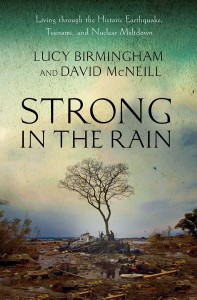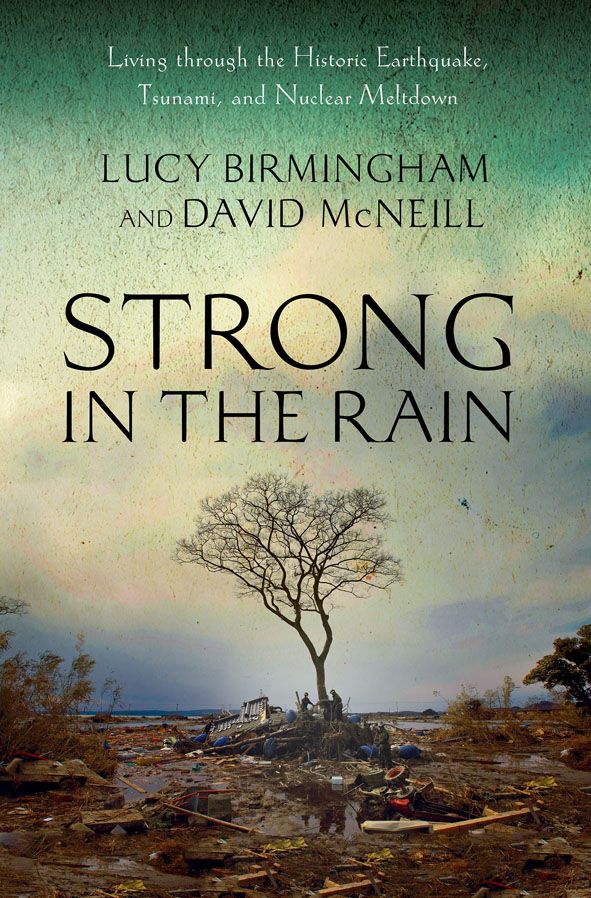Strong in the Rain: Surviving Japan’s Earthquake, Tsunami, and Fukushima Nuclear Disaster by Lucy Birmingham and David Mcneill is a book with the literary density of uranium, it penetrates deeply and leaves the reader with a personal and factual understanding of of Japan’s 3/11 mega-disaster that a simple narrative could never do. The title, is of course, taken from the well-known poem by Kenji Miyazawa about perseverance and compassion. Almost every one in Japan knows the poem–that does not detract from its message.

The most appropriate expression I can use to describe the book is from the Japanese 痛感 (tsukan) literally to “feel pain” the metaphorical meaning being “to keenly know” something. I wasn’t in Japan when the earthquake and the meltdown devastated the nation; I came back 10 days later. This book makes me feel like I was there–like I lived through it. It’s that powerful and evocative. I know both the authors, so maybe I’m not objective. But this is a powerful and almost majestic book. It’s a book I wish I had written…or could write.
The message of “Strong In The Rain” in its tale of foreign and Japanese heroes and villains–and there are both, remains with the reader long after the book is done. Because the book forces us to face the core of our existence: what is it to survive, who do you save and who do you leave, when do we stand up and when do we shut up? What is it be a hero?
It is a book about some amazing Japanese heroes, like the Mayor Sakurai, who fought the yakuza, the complacent press, the Japanese government, and the nuclear industrial complex that is sometimes referred to as “the nuclear village” or by those in the underworld as “the nuclear mafia.” He’s not an action hero–he’s a man of action, a man who changed the coverage of the nuclear meltdown with a simple heartfelt video uploaded onto You Tube in two languages.
He becomes the embodiment in the text of the best qualities of the Japanese spirit and character.
Ms. Birmingham and Mr. McNeill deftly weave together the accounts of the victims and heroes into a Rashomon like account of 3/11 that creates a 4D picture of the tragedy and it does it without the moral relativism or ambiguity of Akutagawa; some problems are painted in shades of grey, but the authors have the courage to put things in black and white where it matters. Sometimes, there is a right and a wrong, a true and false.
The message of “Strong In The Rain” in its tale of foreign and Japanese heroes and villains–and there are both, remains with the reader long after the book is done. Because the book forces us to face the core of our existence: what is it to survive, who do you save and who do you leave, when do we stand up and when do we shut up? What is it be a hero? You don’t have to be a Japanophile to appreciate the human drama in these stories. Anyone who lives in a country where there is nuclear power and natural calamity will find something of interest in this tome.
The message of “Strong In The Rain” in its tale of foreign and Japanese heroes and villains–and there are both, remains with the reader long after the book is done. Because the book forces us to face the core of our existence: what is it to survive, who do you save and who do you leave, when do we stand up and when do we shut up? What is it be a hero? The book provides the questions and some answers. The book is very dense in that important facts are sometime buried in one or two simple sentences. Blink and you miss something important. It’s not an easy read but it is rewarding.
Entire books could be written on the cowardliness of the mainstream Japanese press–SIR does it in a few paragraphs.
Books about disasters come and go, there half-lives are very short. How many books were there on the financial crisis? How many diatribes written about Goldman Sachs? Most of them are no longer on the bookshelves and only a few will remain in the libraries.
“Strong In The Rain” is a book that I think will weather the passage of time very well. Because there are universal truths in the book about heroism, mortality, disaster and Japanese culture that still be relevant long after the physical evidence of Japan’s greatest natural and man-made (nuclear meltdown) disaster are covered up in dirt and concrete.

hello!,I really like your writing very much!
percentage we keep up a correspondence more approximately your post
on AOL? I need an expert in this house to solve my problem.
May be that’s you! Looking ahead to see you.
Hi there, You have done a fantastic job. I will certainly digg it and personally suggest
to my friends. I am confident they will
be benefited from this website.